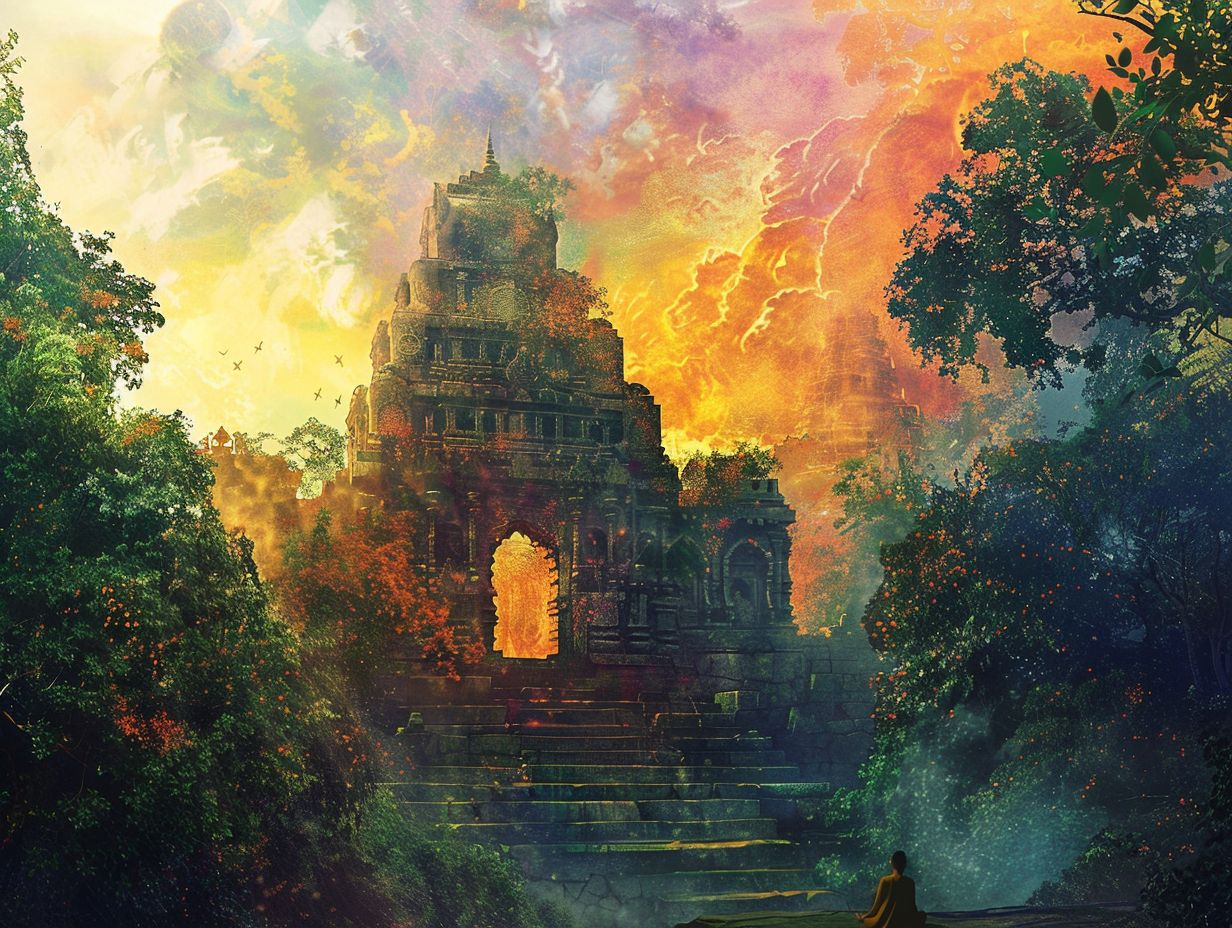An Introduction to Dvaita Philosophy
Dvaita Philosophy, rooted in the teachings of Madhvacharya, offers a profound perspective on the nature of reality, highlighting the intrinsic dualism between God and individual souls.
This exploration delves into the origins of Dvaita, its core beliefs, and its distinctive position in relation to other philosophical schools such as Advaita and Vishishtadvaita.
It examines the significant influence of Dvaita in shaping Hindu practices and its interpretations in contemporary contexts.
Whether one is a newcomer to philosophical inquiry or seeking to deepen their understanding, this journey through Dvaita invites a thoughtful contemplation on spirituality and devotion.
What is Dvaita Philosophy?

Dvaita Philosophy, established by Madhvacharya, offers a distinctive viewpoint within the landscape of Indian philosophy, prominently marked by its doctrine of dualism. This philosophy asserts a fundamental separation between the individual soul and the Supreme Being, or God.
In contrast to Advaita, which promotes a non-dualistic understanding, Dvaita underscores the reality of both the individual and the divine. This dualistic framework provides a profound metaphysical exploration of existence, consciousness, and ultimate reality, alongside the various pathways to liberation (moksha).
Such an approach significantly shapes the philosophical discussions surrounding ethics, spirituality, and the experiential understanding of God within the context of the universe’s creation.
The Founding of Dvaita Philosophy
The origins of Dvaita Philosophy can be traced to the 13th century, spurred by the profound teachings of Madhvacharya. His interpretations of significant religious texts, including the Bhagavad Gita and the Upanishads, provided the foundational principles of this influential school of thought.
Madhvacharya s focus on a personal God and the unique attributes of the divine played a pivotal role in shaping the theological framework of Dvaita, representing a significant milestone in the evolution of religious philosophy within the expansive tapestry of Indian thought.
Who is Madhvacharya?
Madhvacharya, a distinguished philosopher and theologian of the 13th century, is renowned as the founder of Dvaita Philosophy, which champions a dualistic interpretation of reality. This philosophy emphasizes a clear distinction between the individual soul and the Supreme Being (God). His teachings resonate profoundly with the foundational principles of Bhakti and devotional practices, highlighting the significance of divine grace in the quest for liberation (moksha).
Emerging from a time rich in spiritual dialogue, Madhvacharya became a pivotal figure within the broader landscape of Indian philosophy, articulating the uniqueness of each soul’s relationship with the divine. His doctrine not only explored the philosophical dimensions of devotion but also laid out a structured path for individual practice, setting it apart from the non-dualistic schools of thought.
This dualistic perspective has paved the way for contemporary interpretations that continue to inspire numerous spiritual seekers. Madhvacharya’s influential commentaries on seminal texts, including the Upanishads and the Bhagavad Gita, have made a lasting impression, reinforcing the idea that realizing the Supreme Being through devoted commitment is essential for liberation. In doing so, he has significantly shaped modern understandings of faith and spirituality.
What are the Sources of Dvaita Philosophy?
The sources of Dvaita Philosophy are profoundly anchored in significant scriptures, notably the Bhagavad Gita, the Upanishads, and the writings of Madhvacharya himself. These texts serve as the cornerstone for this philosophical exploration, offering invaluable insights into the nature of the Divine, the individual soul, and the ethical conduct imperative for attaining liberation.
In examining these scriptures, one uncovers a nuanced understanding of the dualistic relationship between the Divine and the individual, establishing a framework that stands in stark contrast to non-dualistic theories such as Advaita. The Bhagavad Gita articulates the ethical dilemmas encountered by individuals, underscoring the importance of duty and righteousness, while the Upanishads engage in profound metaphysical discussions surrounding the self and consciousness.
Madhvacharya’s writings further emphasize that devotion to a personal God is essential for spiritual advancement. This perspective not only shapes moral conduct but also guides adherents along a distinct path of righteous living, setting it apart from other philosophical traditions where the dissolution of the self into the absolute may be regarded as the ultimate aim.
The Core Beliefs of Dvaita Philosophy
At its core, Dvaita Philosophy encompasses essential beliefs that embody the principles of dualism, affirming the presence of a personal God and highlighting the importance of devotion (Bhakti) as a means to achieve liberation (moksha).
This dualistic framework posits that the relationship between the individual soul and God is characterized by distinct separation, profoundly shaping ethical conduct, metaphysical inquiries, and the overarching comprehension of existence within the cosmos.
1. The Concept of Dualism
The concept of dualism in Dvaita Philosophy articulates a fundamental distinction between the individual soul (jiva) and God (Brahman), underscoring a relationship that stands in contrast to the non-dualism characteristic of Advaita philosophies. This dualistic perspective asserts that while both the soul and God possess reality, they exist as separate entities within the metaphysical structure of existence.
Such a separation invites a profound exploration of the nature of existence, sparking discussions about the implications for ethical behavior and the individual’s role within the cosmic order. In Dvaita, the acknowledgment of distinct identities fosters a moral framework in which devotion and service to God take precedence, guiding adherents to weave ethical principles seamlessly into their daily lives.
This viewpoint compels practitioners to evaluate their actions through the prism of their relationship with the divine, thereby deepening their responsibilities toward both themselves and others. Consequently, the dualistic outlook not only influences metaphysical inquiries but also shapes the way followers navigate their existential paths, reinforcing the notion that both union and distinction within existence are essential elements of spiritual evolution.
2. The Existence of God

In Dvaita Philosophy, the existence of God stands as a fundamental principle, presenting God as a personal and experiential being endowed with divine attributes that are crucial for nurturing faith and devotion. This theological viewpoint champions the belief in a relational deity, distinguishing itself from the more abstract interpretations of the divine found in various philosophical traditions.
The characteristics ascribed to this God such as omnipotence, benevolence, and omniscience are instrumental in shaping the spiritual practices of devotees. By cultivating a profound personal connection with the divine, followers are inspired to approach their spirituality with both trust and sincerity. This intimate understanding of God sharply contrasts with monistic perspectives, which frequently conceive of divinity as an impersonal force.
The Dvaita perspective advocates for active participation in worship and devotion, emphasizing the importance of surrender and grace. This approach offers a rich framework for exploring both personal faith and communal practices, inviting adherents to engage deeply with their spiritual journey.
3. The Importance of Bhakti
Bhakti, or devotion, holds a significant position within Dvaita Philosophy, serving as a primary avenue toward liberation (moksha) while forging a profound connection between the individual soul and the divine. This strong emphasis on devotion cultivates community, ethical conduct, and a vibrant tradition of spiritual practices grounded in love and surrender to God.
In the expansive realm of spirituality, Bhakti functions as a bridge that transcends individual aspirations, fostering a greater collective consciousness. Practitioners frequently share their experiences, thereby enhancing communal bonds and reinforcing a sense of belonging within their spiritual community.
This practice not only invites an inward journey but also promotes ethical engagement with the world. Individuals derive meaning through acts of compassion and service to others, contributing to a more harmonious society.
At its core, the essence of Bhakti resides in the ongoing exchange of love, leading to transformative experiences that elevate spiritual awareness while deepening the understanding of the divine presence in everyday life.
How is Dvaita Philosophy Different from Other Schools of Thought?
Dvaita Philosophy sets itself apart from other philosophical schools, notably Advaita and Vishishtadvaita, through its steadfast dedication to dualism, which asserts a distinct separation between the individual soul and the divine.
In contrast to Advaita’s advocacy of non-dualism the notion that the soul and God are fundamentally one Dvaita underscores their independent existence.
This fundamental distinction enhances the landscape of comparative philosophy and deepens the discourse surrounding metaphysical inquiries.
1. Advaita Philosophy
Advaita Philosophy, established by Shankara, articulates a profound stance on non-dualism, asserting that the individual soul and God are ultimately one and the same. This perspective stands in stark contrast to the dualistic framework of Dvaita, illuminating significant metaphysical inquiries surrounding the essence of reality and consciousness. Such philosophical discourse shapes the enduring dialogue between these two prominent schools of thought.
At the heart of Advaita lies the assertion that the perception of separateness is an illusion, suggesting that the distinctions drawn between the self and the divine are mere constructs fabricated by the mind. It urges individuals to awaken to their intrinsic unity with Brahman, the ultimate reality, thus promoting a profound sense of liberation and understanding.
In contrast, Dvaita, as articulated by Madhva, steadfastly maintains a distinction between the individual soul, or jiva, and the supreme God, or Ishvara. This framework frames existence as a dynamic interplay between the two entities. Such a divergence not only informs spiritual practices and ethical considerations but also engenders distinctly different interpretations of liberation, unveiling rich philosophical implications that continue to resonate throughout the spiritual landscape.
2. Vishishtadvaita Philosophy
Vishishtadvaita, or qualified non-dualism, presents a sophisticated middle ground between the rigid dualism of Dvaita and the absolute non-dualism of Advaita. This philosophical framework posits that while the individual soul and God are distinct entities, they are inseparable in essence. Such a perspective enriches the discourse surrounding the relationship between the divine and the individual, offering valuable insights that bridge Dvaita and Advaita.
Within this framework, adherents embrace the notion that the universe, individual souls, and the Supreme Being exist in a harmonious interplay. This dynamic relationship stands in stark contrast to the more static view of Advaita, illuminating the relational aspects that are often overlooked. A careful examination of Vishishtadvaita s unique attributes reveals a nuanced approach to the interaction between the finite and the infinite.
Philosophers who delve into this doctrine investigate how conceptualizing God as both transcendent and immanent can significantly reshape perspectives on divine grace, human experience, and the ultimate purpose of life. Such explorations yield profound implications for both spiritual practice and philosophical inquiry, inviting a deeper engagement with the complexities of existence.
The Role of Dvaita Philosophy in Hinduism
Dvaita Philosophy holds a prominent place in Hinduism, intricately shaping a myriad of practices, beliefs, and community dynamics. It emphasizes the significance of devotion (Bhakti) and the worship of a personal God, underscoring the relational aspect of spirituality.
This dualistic framework profoundly influences how adherents engage with spiritual practices, rituals, and ethical values within the expansive tapestry of Hindu society. As a result, it cultivates a sense of community and a shared belief system among its followers, enriching their collective spiritual journey.
1. Influence on Hindu Practices

The influence of Dvaita Philosophy on Hindu practices is distinctly manifested in the ritualistic and devotional dimensions, with Bhakti emerging as a fundamental cornerstone for worship and spiritual engagement. This philosophical perspective inspires adherents to cultivate unwavering faith and actively participate in rituals that articulate their devotion to God.
Such practices typically encompass daily prayers, the chanting of mantras, and participation in communal festivals that honor divine leelas, or pastimes. Each ritual is imbued with a profound emotional resonance, enabling devotees to convey their love and surrender to the divine presence.
Through these acts of devotion, individuals undergo a significant transformation, fostering a sense of belonging within the broader spiritual community. The emphasis on Bhakti within Dvaita encourages practitioners to pursue personal relationships with the divine, thereby cultivating a rich spiritual landscape in Hinduism that celebrates both individual journeys and the communal expression of faith.
2. Impact on Hindu Society
Dvaita Philosophy profoundly influences Hindu society by nurturing a robust sense of community and a shared ethical framework rooted in devotion to God. Its teachings advocate for moral conduct and social responsibility, shaping interpersonal dynamics within the community and guiding individual engagement with spirituality.
This dualistic perspective highlights the distinctions between the individual soul and the supreme divine, fostering a deeper appreciation for each person’s unique role within the collective. By emphasizing devotional practices and ethical behavior, adherents often find themselves more actively involved in both local and broader social initiatives.
As community members embrace these principles, they naturally gravitate toward cooperation and mutual support, reinforcing bonds through shared values and collective ambitions. The emphasis on service, humility, and respect for others cultivates a strong sense of duty that inspires individuals to make meaningful contributions to society, ultimately enhancing the overall wellbeing of their communities.
Criticism of Dvaita Philosophy
Criticism of Dvaita Philosophy frequently centers around its dualistic framework, with some asserting that this perspective may restrict the comprehension of the relationship between the individual soul and the divine. Detractors raise questions about the effectiveness of Bhakti as a path to liberation, proposing that a more nuanced approach to ethics and spirituality might be essential for a deeper understanding.
1. The Concept of Dualism
The concept of dualism within Dvaita often faces critique for its perceived rigidity, with certain philosophers suggesting that it oversimplifies the intricate nature of existence and the divine relationship. This critique serves as an invitation for deeper philosophical inquiry into the metaphysical implications inherent in Dvaita’s dualistic stance.
Advocates of non-dual perspectives frequently emphasize that a stringent separation between the individual self and the Supreme Being fails to adequately account for the intertwined nature of reality. They argue that such a dichotomy risks fostering a fragmented understanding of existence, wherein subjective experiences are overlooked in favor of rigid classifications.
These critiques compel Dvaita to reevaluate its foundational assumptions regarding the nature of the divine and the possibilities for a more inclusive metaphysical framework. Such discussions encourage an exploration of whether integrating elements of non-dualism could enhance the comprehension of the relationship between the individual soul and ultimate reality.
2. The Role of Bhakti
The role of Bhakti in Dvaita Philosophy encounters scrutiny from several scholars who question whether devotion alone suffices for attaining liberation. They suggest that an excessive emphasis on Bhakti might overshadow other vital spiritual practices. This critique prompts significant inquiries regarding the balance between devotion and philosophical exploration in the pursuit of moksha.
Proponents of alternative pathways contend that integrating practices such as meditation, self-inquiry, and ethical living offers a more comprehensive approach to spiritual development. They argue that while devotion possesses considerable merit, the interplay of intellect and self-discipline is equally essential for achieving liberation. Some critiques point out the potential for exclusivity within the Bhakti tradition, advocating for a broader synthesis of diverse spiritual methodologies to enhance the journey toward self-realization.
In this context, the discourse surrounding Bhakti becomes crucial, encouraging a reevaluation of traditional practices and their interconnections in the quest for ultimate freedom.
Modern Interpretations of Dvaita Philosophy
Contemporary interpretations of Dvaita Philosophy demonstrate its remarkable adaptability and enduring relevance within modern society. Various philosophers and scholars delve into its implications for spirituality and ethical conduct, shedding light on its significance in today’s world.
This evolution of thought not only allows Dvaita to participate in the ongoing philosophical discourse but also ensures that its foundational principles remain intact and influential.
1. Dvaita Vedanta

Dvaita Vedanta stands as a modern interpretation of Dvaita Philosophy, highlighting the foundational teachings of Madhvacharya while skillfully adapting them to meet the demands of contemporary spiritual practice and philosophical exploration. This interpretation endeavors to bridge traditional beliefs with the pressing ethical concerns and existential inquiries of the modern world.
By looking into the dualistic relationship between the individual soul and the Supreme Being, this approach resonates profoundly with individuals navigating the complexities of today’s morally ambiguous landscape. Practitioners engage in thoughtful reflection on their responsibilities toward others, all while grappling with critical issues such as environmental ethics, social justice, and mental health.
The teachings invite seekers to cultivate a personal relationship with the divine, thereby fostering a sense of community and shared purpose in an interconnected world. Consequently, while the ancient texts offer timeless wisdom, their reinterpretation sparks a fresh dialogue, rendering them profoundly relevant for those in search of spiritual guidance in contemporary life.
2. Contemporary Dvaita Philosophers
Contemporary Dvaita philosophers play a pivotal role in the evolving discourse surrounding Dvaita Philosophy by providing fresh interpretations that resonate with modern existential and ethical concerns, thus enhancing the comprehension of its teachings. Their scholarly contributions adeptly navigate the delicate balance between traditional spirituality and contemporary philosophical inquiry.
Through meticulous analysis and engaging dialogue, these thinkers delve into pivotal themes such as the nature of the self, the importance of devotion, and the role of ethics in everyday life. They critically address pressing contemporary issues, including social justice, environmental stewardship, and personal identity, all framed within the Dvaita context. This thoughtful integration not only enriches the philosophical landscape but also renders these teachings more accessible to a wider audience in search of meaning in today s intricate world.
By harmonizing ancient wisdom with modern challenges, they pave the way for a revitalized understanding of accountability, love, and the interconnectedness of all beings.
Frequently Asked Questions
What is Dvaita Philosophy?
Dvaita Philosophy is a school of thought in Hinduism that focuses on the concept of duality, or the idea that there are two distinct realities in the universe: the material world and the spiritual world.
Who founded Dvaita Philosophy?
Dvaita Philosophy was founded by the Indian philosopher and theologian Madhvacharya in the 13th century.
What are the main principles of Dvaita Philosophy?
The main principles of Dvaita Philosophy include the belief in the existence of two separate and eternal realities, the concept of individual souls being distinct from the supreme soul, and the idea that ultimate liberation can only be achieved through devotion to God.
How does Dvaita Philosophy differ from other schools of Hinduism?
Dvaita Philosophy differs from other schools of Hinduism, such as Advaita and Vishishtadvaita, in its emphasis on the concept of duality and the idea that the material and spiritual worlds are separate and distinct.
What is the role of devotion in Dvaita Philosophy?
In Dvaita Philosophy, devotion to God is seen as the key to ultimate liberation and the goal of human existence. It is through devotion and surrender to God that one can attain moksha, or liberation from the cycle of birth and death.
Are there any sacred texts associated with Dvaita Philosophy?
The main sacred texts associated with Dvaita Philosophy are the Vedas, the Upanishads, and the Bhagavad Gita. Madhvacharya also wrote several commentaries and philosophical treatises that are highly revered by followers of Dvaita Philosophy.
